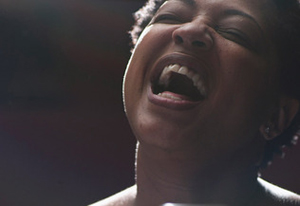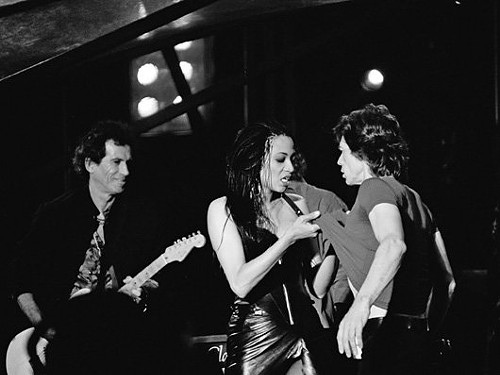20 Feet From Stardom, Morgan Neville’s documentary about backup singers, deserves an objective review because without any qualifications it is the finest film of 2013 thus far. It channels its subjects’ greatest strengths—big wind, an uncanny ear, a fastidious work ethic, a knack for knowing when to sing and when to stop, and an indomitable spirit—and in doing so pulls back the curtain on a rarely considered world, which is the very best function a documentary can fulfill. What’s more, by suggesting with an infectious, clear-eyed joy how this world connects to everything else, it fulfills one of the very best functions of any movie.
But part of what makes this film so extraordinary is that it summons really personal responses. I’ve seen it twice so far and during both screenings the audiences—full of professional critics!—spontaneously burst into applause and tears more than once. God knows I cried through both showings.
At this point I’ll come clean with my own association with the material. My father, an atheist-Jewish computer science professor hailing from lily-white Massachusetts, has had a lifelong romance with R&B, soul, doo-wop, gospel, blues. Certainly he’s not the only Jewish man in his generation to evince a passion for what’s still sometimes known as black music (I won’t even get into how complicated that is) but his commitment has proven steadfast and often endearing. In our family a Sam Cooke or Aretha Franklin album was always spinning on the turntable or pouring out of the car speakers. And at every opportunity he sang those songs himself, warbling in his cracked, earnest falsetto while I did backup.
He taught me young. Starting around 5 or 6, I learned to listen closely so that whenever he’d break into a lead I could chime in with the right oohs, ahhs, babies. I’d croon “No, no, no” while he’d howl Frankie Lymon’s “I’m Not a Juvenile Delinquent.” He’d sing “Respect” and I’d add, “Just a little bit,” just like Aretha’s sisters did. Did I want to sing lead? Not really. I was a daddy’s girl who was fiercely proud to support him as he sang his heart out. But as I began to come into a limelight of my own—around age 11 I started doing some TV spots—my father and I began to part ways. I couldn’t help but observe he preferred to sing lead in his own house, and from this I learned the classic lessons of the backup singer: that sometimes it was better to blend than to shine, that adaptation was necessary for survival, that you had to know when to cut your losses, and that I loved the music for its own sake, regardless of whether I could gain any rewards by doing so.
So I get backup singers. And the dynamite news is that Morgan Neville does, too. He doesn’t trip over himself as he carefully builds the arcs of these individual women’s lives into something that is, fittingly, bigger than the sum of its parts. Starting with a credit sequence in which he slyly reappropriates artist John Baldessari’s work by applying dots to the lead singers in vintage R&B images, Neville draws upon whatever works best to tell this ultimate underdog story. He enlists some of the biggest names in the music business—Sting (poncey as ever), Bruce Springsteen, Stevie Wonder, Mick Freaking Jagger—to lay out the enormity of these women’s contributions to the twin canons of rock and roll and R&B. Wisely, though, he mostly lets the women speak for themselves.
And, oh, the voices in which they do. These women are, after all, lifelong performers so they not only sing with a voltage that straightens out the spine but they know how to deliver a hell of a line.
There’s Darlene Love, a key member of The Blossoms, the backup group who appeared on an astounding array of 50s, 60s and 70s albums. She’s also a tremendous lead singer whose career was derailed by literal and figurative murderer Phil Spector. There’s Stevie Wonder favorite Tata Vega, who possesses a set of pipes so huge and distinctive that they completely belie her baby face and speaking voice. There’s holy-holy Merry Clayton, who had it all—huge voice, diva-like confidence and cool—but never came into full focus despite the fact that she had some serious producers working in her corner. There’s Claudia Lennear, arguably the most gorgeous backup singer of them all, known first as a barely clad Ikette (revealing getup being necessary for Ike Turner’s pimpy self-ideation) before swanning as a sloe-eyed backup for the likes of Mick as well as a Playboy centerfold. And then there’s Lisa Fischer, a “monstrously talented musician” who loves the singing more than she loves the spotlight though she radiates an unbelievable starpower whenever she chooses. I’d say she’s my favorite—she speaks in easy, rhapsodic gales of wisdom and joy–but one of the many brilliances of this film is that it is impossible to pick a favorite anything.
Take Merry’s description of the political climate prevailing when she sang on Lynyrd Skynrd’s “Sweet Home Alabama:” “Musically, it was a happy time but in other ways it was such a sad time.” As she talks, the song plays over footage of the protests and injustices of the era, and you grasp the full subversion of this motley crew howling an homage to what was then the most racially charged region of the nation. It’s hard not to get a lump in your throat. That’s so often the case when these black women, blunt and bemused, spell out the role they’ve played in rock and roll history—how they brought flesh, blood, and color to track after track on both sides of the ocean even as they weren’t always given their due.
Sometimes they were, though. Check out the scene in which Merry and Mick Jagger separately recall the night she recorded backup for the song “Gimme Shelter.” “I was a little pregnant and had curlers in my hair,” she says. “And we got a call at like 2 am, ‘There’s a group of guys in town called the Rolling somebodies and they’re from England.’…So I said to myself, ‘Mm-hmm, I’m gonna do a take and I’m gonna blow them outta this room.'”
Merry’s backup track plays then, by itself: “Rape. Murder. It’s just a shot away. IT’S JUST A SHOT AWAY.” Merry and Mick are shown listening, she with matter-of-fact pride, he with tears in his eyes. “Fucking hell, that’s good,” he says. (As a happy sidebar, this film also reminds us that the best performers are even more awed by the music than by themselves.)
Then there’s the solo that up-and-comer Judith Hill sings in front of billions at the memorial of her mentor and lead singer, Michael Jackson. There’s startling footage of Lisa, now cozily comfortable in sweats and short-cropped hair, when she was a long-legged, long-haired glamazon kicking up the stage with Luther Vandross, Patti Austin, and Mick. There’s Claudia tripping around with Mick—yes, Mick again. (Man, he loves these ladies.) There’s Darlene, who, after years of being relegated to cleaning other people’s homes, finally gets inaugurated into the Rock and Roll Hall of Fame by a deeply admiring Bette Midler.
Highlight follows highlight in a way that you just normally do not encounter in music biopics, which all too often follow the trajectory of people’s actual lives: dull, depressing, damned. But that’s when you focus on just on one life, and what Neville nails here is that in the world of backup singing it’s never just one. With subtle and sharp editing, he whittles down his breadth of material (the hardest aspect of documentary storytelling) so that all these stories soar and dip without feeling like too much of a good thing.
It’s impossible to achieve this without a nod to spirituality—gospel is the musical tradition from which most of these singers emerge—and Neville doesn’t shy from that topic anymore than he shies from the topic of race. In a quick, amazing montage, he nails just how many of these ladies grew up singing in the church; were, in fact, pastors’ daughters. References to God and Jesus pepper everyone’s conversations. These are sophisticated references—not to the God as Santa Claus who populates New Age solipsisms and the winner’s, often-cannibalistic Christianity but to the God who grants you a calling without many easy rewards. At core this film is about grace in all senses of that word, smack in the face of disappointment. It’s about failing—for each of these women tell sad tales of ceilings that did not break, falls that were not cushioned—and figuring out what’s left after that. It’s about loving and embodying something that is as egoless as the Buddha himself would advise us to be. It’s about acceptance.
Witness Lisa, possibly the most talented and definitely the least inclined to stardom. Soft and wide and wonderfully alive in spirit and in voice, she speaks of the great joy that singing, whether as backup or as lead, has brought to her life. “I always felt like I belonged to everyone, [that] a part of my heart, a part of who I am belongs to everybody. So sometimes when I talk to my friends who have children or who are married, I think to myself, Maybe I should have done that kind of thing. But you know: I’m good. I’m so good.”
This is a film about what happens when you join your best and biggest self with others. It’s about true communion, and it’s why, even more than any personal association I have with the material, I couldn’t stop crying as these blisteringly strong, talented women sang and talked. As Merry Clayton says near the end of the film, “Stay cool, stay humble, stay beautiful and just do the work.”
Like I said: the best film of 2013. Everyone needs to see it.




